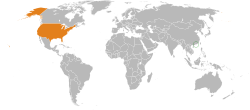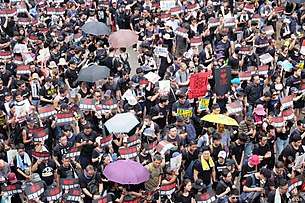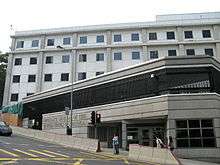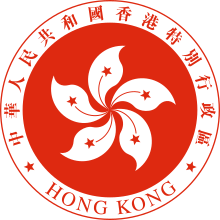Hong Kong–United States relations
Hong Kong–United States relations are bilateral relations between Hong Kong and the United States.
 | |
Hong Kong |
United States |
|---|---|
| Diplomatic mission | |
| Hong Kong Economic and Trade Office,Washington, D.C. | United States Consulate General, Hong Kong |
According to the 2012 U.S. Global Leadership Report, 44% of Hong Kong people approve of U.S. leadership, with 38% disapproving and 18% uncertain.[2]
History
U.S. policy toward Hong Kong, grounded in a determination to promote Hong Kong's prosperity, autonomy, and way of life, is stated in the U.S.–Hong Kong Policy Act of 1992, which stipulated that the U.S. would continue to treat Hong Kong apart from the People's Republic of China even after the 1997 transfer of sovereignty marking the end of British rule. The United States maintains substantial economic and political interests in Hong Kong. The United States supports Hong Kong's autonomy by concluding and implementing bilateral agreements; promoting trade and investment; arranging high-level visits; broadening law enforcement cooperation; bolstering educational, academic, and cultural links; and supporting the large community of U.S. citizens and visitors.
Hong Kong is an active member of the global coalition against terrorism, and has joined the Container Security Initiative and remains an important partner with regard to eliminating funding for terrorist networks and combating money laundering. Hong Kong has passed legislation designed to bring it into compliance with applicable UN anti-terror resolutions and Financial Action Task Force recommendations.
The United States has substantial economic and social ties with Hong Kong. There are some 1,100 U.S. firms, including 881 regional operations (298 regional headquarters and 593 regional offices), and about 85,000 American citizens in Hong Kong.[4] According to U.S. Government statistics, U.S. exports to Hong Kong totaled $17.8 billion in 2006. U.S. direct investment in Hong Kong at the end of 2006 totaled about $38.1 billion, making the United States one of Hong Kong's largest investors, along with China, Japan, and the Netherlands.
The United States and Hong Kong signed a civil aviation agreement in October 2002, which significantly liberalised the aviation market. Hong Kong enjoys a high degree of autonomy as a separate customs territory, with no changes to borders, staffing, or technology export controls since the 1997 handover. Intellectual property rights (IPR) protection has improved substantially in recent years and the introduction of effective new legislation to control illicit production and improved enforcement has now made Hong Kong a regional model for effective IPR protection. The Office of the U.S. Trade Representative and other U.S. agencies now regularly cite Hong Kong as an example for others.
The Hong Kong government maintains Economic and Trade Offices in Washington, D.C., New York City, and San Francisco.
The United States Consulate General Hong Kong is located at 26 Garden Road, Hong Kong. Despite the name, the Consulate General is not subordinate to their country's embassy to the PRC in Beijing. The Consul-General of the United States holds ambassadorial rank, and reports to the Assistant Secretary of State for East Asian Affairs in the US Department of State.[5] By contrast, the US Consuls-General posted to Chengdu, Guangzhou, Shanghai, and Shenyang report to the Deputy Chief of Mission of the US Embassy in Beijing who is directly subordinate to the US ambassador.
Edward Snowden
The Edward Snowden incident in 2013 had been a diplomatic crisis between Hong Kong and United States. On May 20, 2013, Edward Snowden, a former Central Intelligence Agency (CIA) employee, arrived in Hong Kong. He leaked classified information from the National Security Agency (NSA) in Hong Kong in early June. Snowden disclosed that "the United States government has committed a tremendous number of crimes against Hong Kong. The PRC as well,"[6] going on to identify Chinese Internet Protocol addresses that the NSA monitored and stating that the NSA collected text-message data for Hong Kong residents.[7] On June 22, U.S. officials revoked his passport.[8] On June 23, Snowden boarded a commercial flight to Moscow.[9]
The incidence had proven to be a rare diplomatic conflict between Hong Kong and the United States. The United States has extradition treaties with more than 100 countries, excluding People's Republic of China and Republic of China but including Hong Kong, due to Hong Kong's autonomy in developing relations with foreign nations in a broad range of appropriate fields.[10] Snowden, however, had not been detained by Hong Kong as requested by the United States. Hong Kong authorities said that it was because the United States' extradition request had not fully complied with Hong Kong law,[11][12] and there was no legal basis to prevent Snowden from leaving.[13][14][Notes 1] On June 24, U.S. State Department spokesman Patrick Ventrell said "we're just not buying that this was a technical decision by a Hong Kong immigration official. This was a deliberate choice by the government to release a fugitive despite a valid arrest warrant ... though the Privacy Act prohibits me from talking about Mr. Snowden's passport specifically, I can say that the Hong Kong authorities were well aware of our interest in Mr. Snowden and had plenty of time to prohibit his travel."[17]

2019–20 Hong Kong protests
A series of protests against the Hong Kong government broke out on 15 March 2019, in response to the 2019 Hong Kong extradition bill. By 9 June, the protests became the subject of global attention as demonstrations grew more violent. The New York Times writes, “Fueled by anger toward the police, as well as the slow erosion of civil liberties, the largely leaderless protests morphed into a broader, more complicated movement about protecting freedoms, democracy and Hong Kong’s autonomy. The list of protesters’ demands has grown to include amnesty for arrested participants and direct elections for all lawmakers and the chief executive.” The bill has since been eradicated, but protests continue.[18]
In August 2019, foreign ministry spokeswoman of China Hua Chunying said: "As you all know, they are somehow the work of the US" and that China would "never allow any foreign forces" to interfere in Hong-Kong, and warned that "those who play (with) fire will only get themselves burned."[19] So far this has been the most direct accusation Beijing has made against the US.
However when president Trump commented on the ongoing protests in a Global Times interview [20] he said: "At some point they are going to want to stop the riots. But that's between Hong Kong and that's between China, because Hong Kong is a part of China." Joseph Cheng, a retired political science professor who is involved in Hong Kong’s pro-democracy movement commented on president Trump's comment, he said: "It appears to the Hong Kong people that the Hong Kong issue is not an important issue in the agenda of the president.”, as reported by Bloomberg.[21]
In early September 2019, Hong-Kong protesters were waving "tens of thousands" of US-flags on a march to the US Consulate in Hong Kong asking for help from the Trump administration to help end the confrontations with the Hong Kong government, as reported by CNN.[22]
In November 2019, United States President Donald Trump signed the Hong Kong Human Rights and Democracy Act, which banned the sale of crowd-control munitions like tear gas and rubber bullets to the Hong Kong police. This harmed the United States’ relations with the Hong Kong Government, although both bills have seen strongly positive reactions among the Hong Kong protestors. [23]
The South China Morning Post writes, "The Human Rights and Democracy Act is an extension of the Hong Kong Policy Act, the basis of the US approach since 1992. The US believes human rights are universal, and has a long-standing policy that China should honor its agreements on Hong Kong" and that "It is the United States’ long-standing policy that China honor its commitments to protect those rights, as outlined in the Sino-British Joint Declaration of 1984, an international treaty filed with the United Nations." [24]
The removal of Hong Kong's special status with US over communist government’s new security law
On 28 May 2020, China’s National People's Congress approved the controversial national security laws for Hong Kong, which aim at cracking down protests and ban "any acts or activities" that the communist government considers to endanger China’s national security. The critics have called this new legislation a “killer blow” to Hong Kong’s autonomy and freedoms. The legislation allows the government’s national security agencies to operate in Hong Kong.[25]
On 29 May 2020, US president Donald Trump ordered to remove the exemptions that give Hong Kong special status in America due to Beijing’s new national security law for the territory. Trump announced that the extradition treaty between Hong Kong and the US will be affected, the US travel guidance for this territory will be changed, and the officials who undermined Hong Kong’s freedoms will be sanctioned.[26] The Hong Kong Autonomy Act, which imposes sanctions on officials and entities that help violate Hong Kong's autonomy, was signed into law by President Trump on 14 July 2020, following the enactment of the Hong Kong national security law in June 2020.[27]
See also
Notes
- Hong Kong's Secretary for Justice Rimsky Yuen argued that government officials did not issue a provisional arrest warrant for Snowden due to "discrepancies and missing information" in the paperwork sent by U.S. authorities. Yuen explained that Snowden's full name was inconsistent, and his U.S. passport number was also missing.[15] Hong Kong also wanted more details of the charges and evidence against Snowden to make sure it was not a political case. Secretary for Justice Rimsky Yuen said he spoke to U.S. Attorney General Eric Holder by phone to reinforce the request for details "absolutely necessary" for detention of Snowden. Yuen said "As the US government had failed to provide the information by the time Snowden left Hong Kong, it was impossible for the Department of Justice to apply to a court for a temporary warrant of arrest. In fact, even at this time, the US government has still not provided the details we asked for."[16]
References
- The President’s Executive Order on Hong Kong Normalization, White House, 14 July 2020
- U.S. Global Leadership Project Report - 2012 Gallup
- Declared Turtle Trade From the United States: Destinations (data for 2002-2005)
- https://www.uscc.gov/sites/default/files/Research/USCC%20Issue%20Brief_HK%20Extradition%20Bill.pdf "Hong Kong’s Proposed Extradition Bill Could Extend Beijing’s Coercive Reach: Risks for the United States". U.S.-China Economic and Security Review Commission. May 7, 2019.
- Christopher J. Marut Appointed as Director of the Taipei Office of the American Institute in Taiwan, American Institute in Taiwan, May 8, 2012
- Lana Lam (June 12, 2014) Edward Snowden in Hong Kong South China Morning Post
- Eli Lake (June 25, 2013) Greenwald: Snowden's Files Are Out There if 'Anything Happens' to Him The Daily Beast
- US revokes NSA leaker Edward Snowden's passport, as he reportedly seeks asylum in Ecuador Fox News Channel June 23, 2013
- Shane, Scott (June 23, 2013). "Offering Snowden Aid, WikiLeaks Gets Back in the Game". The New York Times. Retrieved April 11, 2015.
- "9-15.100 International Extradition and Related Matters: Definition and General Principles". United States Attorneys' Manual. U.S. Department of Justice. Retrieved 11 June 2013.
- Perlez, Jane; Bradsher, Keith (June 24, 2013). "China Said to Have Made Call to Let Leaker Depart". The New York Times. p. A9 (US edition).
- "HKSAR Government issues statement on Edward Snowden" (Press release). Hong Kong Government. June 23, 2013.
- "Snowden left HK lawfully: CE". Hong Kong Information Services Department. June 24, 2013.
- "No delay in Snowden case: SJ". Hong Kong Information Services Department. June 25, 2013.
- "Hong Kong did not assist Snowden's departure". Global Post. Agence France-Presse. June 25, 2013. Archived from the original on July 12, 2013.
Yuen also said there were discrepancies and missing information in documents used to identify Snowden. 'On the diplomatic documents, James was used as the middle name, on the record upon entering the border, Joseph was used as the middle name, on the American court documents sent to us by the American Justice department, it only said Edward J Snowden,' he said. Hong Kong authorities also noticed that documents produced by the U.S. did not show Snowden's American passport number.
- Luk, Eddie (June 26, 2013). "Justice chief spells it out". The Standard. Hong Kong. Archived from the original on August 22, 2013.
- Daily Press Briefing United States Department of State June 24, 2013
- Victor, Daniel; Ives, Mike (2019-10-15). "Why Are People Protesting in Hong Kong?". The New York Times. ISSN 0362-4331. Retrieved 2019-12-05.
- Westcott, Ben. "China is blaming the US for Hong Kong protests". CNN. Retrieved 2020-01-20.
- "Trump tells truth about HK riot, sets off hysteria among backers of violence - Global Times". www.globaltimes.cn. Retrieved 2020-01-20.
- "Bloomberg - Are you a robot?". www.bloomberg.com. Retrieved 2020-01-20.
- Ben Westcott; Julia Hollingsworth; Caitlin Hu. "Hong Kong protesters call for help from Trump". CNN. Retrieved 2020-01-20.
- Cochrane, Emily; Wong, Edward; Bradsher, Keith (2019-11-27). "Trump Signs Hong Kong Democracy Legislation, Angering China". The New York Times. ISSN 0362-4331. Retrieved 2019-12-05.
- "Human rights are universal, which is why the US stands with Hong Kong". South China Morning Post. 2019-12-10. Retrieved 2019-12-11.
- Kuo, Lily (2020-05-28). "Chinese parliament approves controversial Hong Kong security law". The Guardian. ISSN 0261-3077. Retrieved 2020-05-31.
- Riley-Smith, Ben (2020-05-29). "Donald Trump orders removal of Hong Kong's special status with US over new security law". The Telegraph. ISSN 0307-1235. Retrieved 2020-05-31.
- "Trump signs Hong Kong autonomy act, ending trade preferences". Al Jazeera.



